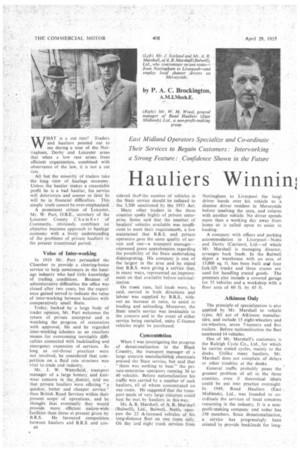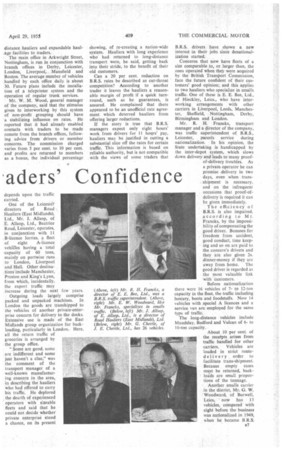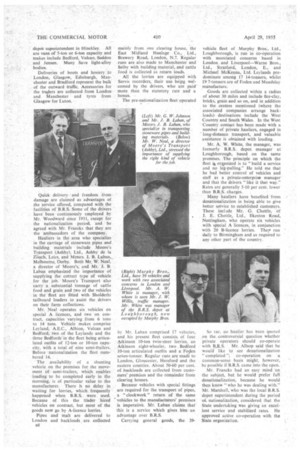Hauliers Winnin aders' Confidence
Page 40

Page 41

Page 42

If you've noticed an error in this article please click here to report it so we can fix it.
East Midland Operators Specialize and Co-ordinate Their Services to Regain Customers: Interworking a Strong Feature: Confidence Shown in the Future by P. A. C. Brockington,
WHAT is a cut rate? Traders and hauliers pointed out to me during a tour of the Nottingham, Derby and Leicester areas that when a low rate arises from efficient organization, combined with observance of the law, it is not a cut rate.
All but the minority of traders take the long view of haulage economy. Unless the haulier makes a reason-able profit he is a bad haulier, his service will deteriorate and sooner or later he will be in financial difficulties. This simple truth cannot he over-emphasized.
A prominent citizen of Leicester, Mr. W. Purt, 0.B.E., secretary of the Leicester County Chamber of Commer&, obviously combines an objective business approach to haulage economy with a lively understanding of the problems of private hauliers in the present transitional period.
Value of Inter-working
In 1919 Mr. Purt persuaded the Chamber to provide a clearing-house service to help newcomers in the haulage industry who had little knowledge of trading conditions. Because of administrative difficulties the office was closed after two years, but the experience gained served to indicate the value of inter-working between hauliers with comparatively small fleets.
Today, backed by a large body of trader opinion, Mr. Purt welcomes the return of private enterprise and is watching the progress of restoration with approval. He said he regarded inter-workfng schemes as an excellent means for overcoming inevitable difficulties connected with backloading and emergency expansion of services. So long as cut-throat practices were not involved, he considered that competition on a fluid rate structure was vital to trade and industry.
Mr. J. W. Waterfield, transport manager of a large hosiery. and knitwear concern in the district, told me that private hauliers were offering "a quicker, better and cheaper service" than British Road Services within their present scope of operations, and he thought that eventually they would provide more efficient nation-wide facilities than those at present given by B.R.S. He favoured competition between hauliers and B.R.S. and con
B6 sidered thato the number of vehicles in the State service should be reduced to the. 3,500 sanctioned by the 1953 Act.
Many other traders in the three counties spoke highly of private enterprise. Some said that the number of hauliers' vehicles available was insufficient to meet their requirements, a few maintained that B.R.S. and private operators gave the same quality of service and one—a transport manager— expressed grave apprehension regarding the possibility of the State undertaking disintegrating. His company is one of the largest in the area and he stated that B.R.S. were giving a service that, in many ways, represented an improvement on that available before nationalization.
On truek runs, full loads were, he said, carried in both directions and labour was supplied by B.R.S., without an increase in rates, to assist in loading and unloading. Moreover, the State smalls service was invaluable to the concern and in the event of either service being curtailed, extra C-licence vehicles might be purchased.
Concentettion
When I was investigating the progress of denationalization in the Black Country, the transport manager of a large concern manufacturing chemicals praised the State service, but said that "there was nothing to beat" the private-enterprise operators running 30 to 40 vehicles. Before nationalization his traffic was carried by a number of such hauliers, all of whom concentrated on one route. He suggested that the transport needs of very large concerns could best be met by hauliers in this way.
Mr. A. R. Marshall, of A. R. Marshall (Bulwell), Ltd., Bulwell, Notts, operates the 22 A-licensed vehicles of his long-distance fleet on one route only. On day and night trunk services from Nottingham to Liverpool the 1°41 driver hands over his vehide to a shunter driver resident in Merseyside before r,eaching the area, and returns with another vehicle. No driver spends more than a working day away from home or is called upon to assist in loading.
A company with offices and parking accommodation in Liverpool—Notts and Derby (Carriers), Ltd.—of which Mr. Marshall is managing director, arranges back loads. In the Bulwell depot a warehouse with an area of 15,000 sq. ft. has been built anal four fork-lift trucks and three cranes are used for handling crated goods. The premises also include a covered garage for 55 vehicles and a workshop with a floor area of 60 ft. by 45 ft.
Atkinson Only
The principle of specialization is also applied by Mr. Marshall to vehicle types. All are of Atkinson manufactdre, and include 15 eight-wheelers and six-wheelers, seven 7-tonners and five trailers. Before nationalization the fleet numbered 14 vehicles.
One of Mr. Marshall's customers is the Raleigh Cycle Co., Ltd., for which he carries crated cycles, mainly to the docks. Unlike many hauliers, Mr. Marshall does not complain of delays or other troubles at the docks.
General traffic probably poses the greatest problem of all in the three counties, even if theoretical ideals could be put into practice overnight. In .1949, Road Hauliers (East Midlands), Ltd., was founded to coordinate the services of local concerns remaining in the industry. It is a nonprofit-making company and today has .350 members. Since denationalization, a service has progressively been created to provide backloads for long distance hauliers and expandable haulage facilities to traders.
The main office in Arkwright Street, Nottingham, is run in conjunction with branch offices in Derby, Leicester, London, Liverpool, Mansfield and Boston. The average number of vehicles handled by each office daily is about 30. Future plans include the installation of a teleprinter system and the operation of regular trunk services.
Mr. W. M. Wood, general manager of the company, said that the stimulus given to interworking by this system of non-profit grouping should have a stabilizing influence on rates. He reported that it had already enabled contacts with traders to be made remote from the branch offices, following advice from drivers or member concerns. The commission charged varies from 5 per cent. to 10 per cent. and profits are returned to members as a bonus, the individual percentage depends upon the traffic carried.
One of the Leicester directors of Road Hauliers (East Midlands), Ltd., Mr. J. Allsop, of E. Allsop, Ltd., Beatrice Road, Leicester, operates, in conjunction with 11 B-licence lorries, a fleet
of eight A-licence vehiaes having a total capacity of 60 tons, mainly on portwise runs to London, Liverpool and Hull. Other destinations-include Manchester, Preston and King's Lynn, from which, incidentally, the export traffic may increase during the next few years.
Outgoing loads largely comprise packed and unpacked machines. In London the goods are transhipped to the vehicles of another private-enterprise concern for delivery to the docks. Extensive use is made of the East Midlands group organization for backloading, particularly in London. Here. all the return traffic of groceries is arranged by the group office.
"Some are good, some are indifferent and some just haven't a clue," was the comment of the transport manager of a well-known manufacturing concern in the area, in describing the hauliers who had offered to carry his traffic. He deplored the dearth of experienced operators with sizeable fleets and said that he could not decide whether private enterprise stood a chance, on its present showing, of re-creating a nation-wide system. Hauliers with long experience who had returned to long-distance transport were, he said, getting back into their stride, to the benefit of their old customers.
Can a 20 per cent. reduction on B.R.S. rates be described as cut-throat competition? According to another trader it leaves the hauliers a reasonable margin of profit if a quick turnround, such as he guarantees, is assured. He complained that there appeared to be an unofficial rate agreement which deterred hauliers from offering larger reductions, If the story is true that B.R.S. managers expect only eight hours' work from drivers for 11 hoqrs' pay, hauliers may be justified in cutting a substantial slice off the rates for certain traffic. This information is based on reliable authority, but is not compatible with the views of some traders that B.R.S. drivers have shown a new interest in their jobs since denationalization started.
Concerns that now have fleets of a size comparable to, or larger than, the ones operated when they were acquired by the British Transport Commission, face the future confident of their customers' good opinion; and this applies to two hauliers who specialize in smalls traffic. One of these is E. E. Bee, Ltd., of Hinckley, Leics., who have interworking arrangements with other carriers in Liverpool, Leeds, Manchester, Sheffield, Nottingham, Derby, Birmingham and London.
Mr. R. H. Francks, transport manager and a director of the company, was traffic superintendent of B.R.S., Leicester, parcels service during nationalization. In his opinion, the State undertaking is handicapped by the inter-depot system, which slows down delivery and leads to many proof of-delivery troubles. As a private. operator he can promise delivery in two days, even when trans shipment is necessary, and on the infrequent occasions that proof-ofdelivery is required it can be given immediately.
The efficiency of B.R.S. is also impaired, according to Mr. Francks, by the impossibility of compensating the good driver. Bonuses for freedom from accident, good conduct, time keeping and so on are paid to the concern's drivers and they are also given 2s. dinner-money if they are away from home. The good driver is regarded as the most valuable link with customers.
Before nationalization there were 16 vehicles of 7to 12-ton capacity in the fleet, the traffic including hosiery, boots and foodstuffs. Now 14 vehicles with special A licences and a service van are employed for the same type of traffic.
The long-distance vehicles include Maudslay, Bedford and Vulcan of 6to 10-ton capacity.
About 10 per cent. of the receipts arises from traffic handled for other carriers. Vehicles are loaded in strict routedelivery order to facilitate trans-shipment. Because empty cases must be returned, backlads are small proportions of the tonnage.
Another smalls carrier in the district, Mr. G. W. Woodward, of Burwell, Leics, ' now has 13 vehicles, compared with eight before the business was nationalized in 1949, when he became B.R.S. depot superintendent in Hinckley. All are vans of 5-ton or 6-ton capacity and makes include Bedford, Vulcan, Seddon and Jensen. Many have light-alloy bodies.
Deliveries of boots and hosiery to London, Glasgow, Edinburgh, Manchester and Bradford represent the bulk of the outward traffic. Accessories for the traders are collected from London and Manchester and tyres from Glasgow for Luton, Quick delivery and freedom from damage are claimed as advantages of the service offered, compared with the facilities of B.R.S. Some of the drivers have been continuously employed by Mr. Woodward since 1931. except for the nationalization period, and he agreed with Mr. Francks that they are the ambassadors of the company.
Hauliers in the area who specialize in the carriage of stoneware pipes and building materials include Moores Transport (Ashby), Ltd., Ashby de la Leics, and Messrs. J. B. Laban,,, Melbourne, Derby. Both Mr. W. Neal. a director of Moore's, and Mr. J. B. Laban emphasized the importance of supplying the correct type of vehicle for the job. Moore's Transport also carry a substantial tonnage of cattle food and grain and two of the vehicles in the fleet are fitted with Sholc1erhi tailboard loaders to assist the drivers on their farm collections.
Mr. Neal operates six vehicles on special A licences, and two on contract, capacities varying from 6 tons to 14 tons. Vehicle makes comprise Leyland, A.E.C., Albion, Vulcan and Bedford, two of the Ley lands and the three Bedfords in the fleet being articulated outfits of 12-ton or 10-ton capacity, with a total of nine semi-trailers. Before nationalization the fleet numbered 14.
The availability of a shunting vehicle on the premises for the movement of semi-trailers, which enables loading to be completed early in the morning, is of particular value to the manufacturer. There Is no delay in waiting for lorries, which frequently happened when B.R.S. were used. Because of this the trader hired vehicles on contract, but most of the goods now go by A-licence lorries.
Pipes and malt are delivered to London and back loads are collected mainly from one clearing house, the East Midland Haulage Co., Ltd., Brewery Road, London, N.7. Regular runs are also made to Manchester and Selby with building material, and cattle food is collected as return loads.
All the lorries arc equipped with Servis recorders, their use being welcomed by the drivers, who are paid more than the statutory rate and a bonus.
The pre-nationalization fleet operated by Mr. Laban comprised 17 vehicles, and his present fleet consists of four Atkinson 10-ton twin-steer lorries, an Atkinson eight-wheeler, two Bedford 10-ton articulated outfits and a Fopen seven-tonner. Regular runs are made to London, Gloucester, Hereford and the eastern counties. About 50-60 per cent. of backioads are collected from customers' premises and the remainder from clearing houses.
Because vehicles with special fittings are required for the transport of pipes, a " clockwork" return of the same vehicles to the manufacturers' premises is imperative. Mr. Laban claims that this is a service which gives him, an advantage over B.R.S.
Caming general goods, the 39
vehicle fleet of Murphy Bros., Ltd., Loughborough, is run in co-operation with associated concerns based in London and Liverpool—Warne Bros., Ltd., Stratford, London, E., and Michael McKenna, Ltd. Leylands predominate among 17 14-tonners, whilst 19 7-tonners are of Foden and Maudslay manufacture.
Goods are collected within a radius of about 30 miles and include fire-clay, bricks, grain and so on, and in addition to the centres mentioned (where the associated companies arrange backloads) destinations include the West Country and South Wales. In the West -Country contact has been made with a number of private hauliers, engaged in long-distance transport, and valuable assistance is obtained with loading.
Mr. A. W. White, the manager, was formerly B.R.S. depot manager at Loughborough, based on the same premises. The principle on which the fleet igv organized is to "build a service and no leg-pulling." He told me that he had better control of vehicles and staff as a private-enterprise manager and that the drivers "like it that way." Rates are generally 5-10 per cent. lower than B.R.S. charges.
Many hauliers have benefited from denationalization in being able to give better service to established customers. These Mel ado Mr. G. Chettle, of J. E. Chettle, Ltd., Ilkeston Road, Nottingham, who operate six vehicles with special A licences, in conjunction with 20 B-licence lorries. The)' run daily to Birmingham and as required to any other part of the country.
So tar, no haulier has been quoted on the controversial question whether private operators should co-operate with KIS. Mr. Allsop said that he would like to see denationalization "completed "; co-operation on a common-sense basis might, however, be possible if B.R.S. came into the open.
Mr. Francks had an easy mind on the subject, but he would prefer full denationalization, because he would then know "who he was dealing with." Mr. Marshall, who was the local B.R.S. depot superintendent during the period of. nationalization, considered that the State undertaking was giving an excellent service and stabilized rates. He approved active co-operation with the State organization.




































































































